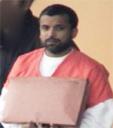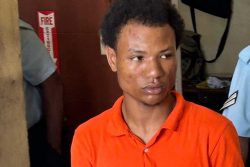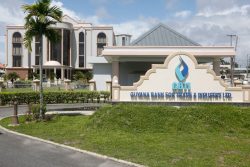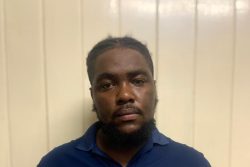 In one of the most shocking revelations since the indictment of businessman Roger Khan on drug-smuggling charges, the US government on Thursday disclosed that he had ordered the executions of Davendra Persaud, who was gunned down in Palm Court over three years ago, as well as several of its informants and other drug dealers.
In one of the most shocking revelations since the indictment of businessman Roger Khan on drug-smuggling charges, the US government on Thursday disclosed that he had ordered the executions of Davendra Persaud, who was gunned down in Palm Court over three years ago, as well as several of its informants and other drug dealers.
The US did not name the informants, who were described as cooperating witnesses, but sources said they might have been the five men killed on Diwali night on Robb Street next door to Nigel’s Supermarket in 2002.
The revelations were made in the Eastern District Court of New York after Khan’s attorneys got hold of a sealed confidential document, which contained an interview between Persaud and the US government in relation to a narcotics case against another Guyanese Delven Adams, who was a member of Khan’s organisation. The US’s objections to the defence obtaining the document could potentially spark a heated court session slated for Monday.
 In a letter dated April 24, and addressed to Justice Dora Irizarry, US Attorney Benton Campbell said he was apprising the court of an issue that the government will raise at the status conference scheduled for Monday. Campbell said that as part of Khan’s lawyers’ opposition to the US government’s motion for an anonymous jury, they attached several exhibits. One of these was a report from the US Customs Service, now Immigration and Customs Enforcement (“ICE”), of an interview with Persaud. Campbell said this report was an official and confidential internal ICE document, used for investigative purposes, that was disclosed by the government to defence counsel at trial in a case against Delven Adams and others.
In a letter dated April 24, and addressed to Justice Dora Irizarry, US Attorney Benton Campbell said he was apprising the court of an issue that the government will raise at the status conference scheduled for Monday. Campbell said that as part of Khan’s lawyers’ opposition to the US government’s motion for an anonymous jury, they attached several exhibits. One of these was a report from the US Customs Service, now Immigration and Customs Enforcement (“ICE”), of an interview with Persaud. Campbell said this report was an official and confidential internal ICE document, used for investigative purposes, that was disclosed by the government to defence counsel at trial in a case against Delven Adams and others.
Adams was busted in the US with drugs in 2004. According to Campbell, the report and some other material were disclosed to defence counsel in that trial pursuant to Rule 806 of the Federal Rules of Evidence, because it could be used to impeach Persaud, whose statements were admitted as co-conspirator statements through other witnesses.
Campbell said the US government satisfying its obligations, however, did not entitle defendants to file or otherwise disseminate that material outside the litigation. He argued that in the Adams trial, the government had serious concerns about witness safety, in large part because Persaud’s testimony as well as testimony from 3,500 material witnesses implicated various individuals in Khan’s organisation.
However, Campbell disclosed that Persaud, who was a co-conspirator of Khan, the Adams’ trial defendants, and the government’s cooperating witnesses in the Adams’ case, was gunned down in Guyana on Khan’s orders as he perceived that Persaud was cooperating with the US government. “In an effort to protect witnesses, Judge Frederic Block ordered the defence attorneys in that case not to disseminate the 3,500 material to anyone other than their clients. Unfortunately, Judge Block’s order was violated – as defence counsel in this case has possession of this Customs report. The government did not provide this report to defence counsel in this case, and it was only disseminated in the Adams case,” Campbell wrote to the judge.
He said the US government was writing to inform the court of the issue, and to request the court to inquire of Khan’s lawyers at Monday’s status conference: how, from whom, and when they obtained the report. The government also wants to know whether they have obtained any of the statements of the 3,500 material witnesses disseminated at the Adams trial; and whether they have disseminated any of this to anyone else. “We further request that the court order the prompt return to the government of any such material in the defence’s possession – including all copies they have made of such material,” Campbell requested.
He said while Khan’s lawyers might not have been aware of Judge Block’s order, this inquiry was important not only because a court order was violated, but because the potential danger to witnesses and their families in this case could not be overstated. “It is imperative that the government has complete knowledge of the full scope of the information disseminated about its prior witnesses, so as to take necessary safety precautions,” Campbell stated.
Khan’s lead attorney, Robert Simels in a response yesterday told the court that the documents were obtained from the clerk’s office on March 31, this year. Simels said following the court appearance in this case his associate requested an opportunity to obtain a copy of the criminal complaint against an individual named Brentnoll Hooper in the file entitled US vs. Adams.
Simels said the clerk provided a box containing courts transcripts and other documents. “In reviewing the file my associate noticed that Persaud’s documents were in an envelope ‘not sealed’ in the file. She made copies of same,” Simels said in his letter.
Khan is facing charges for conspiring to import cocaine into the US.
Late last year this newspaper had reported that US was to introduce as evidence a ledger of Persaud, who was also a boutique owner, which contained the names of alleged drug dealers.
Persaud was gunned down at Palm Court in October 2004 by unknown persons. One of Khan’s lawyers here had told this newspaper that the US might be hoping to use some of the persons on Persaud’s ledger to give evidence against Khan.
Persaud was shot close to 15 times, in what appeared to be an organised hit, orchestrated by a gang of four. Persaud had been charged locally in relation to drugs and later became an informant for the US government. Reports were that four men, two of whom were wearing masks, turned up at the Main Street bar in a white Toyota Sprinter car registration number PJJ 1767 a little before 10 pm. Two men remained in the car, another stood guard at the gate, while one went up to Persaud and shot him. The gunman reportedly stood over him and opened fire at close range.
Police had arrested a number of persons for questioning, but they were all released.







